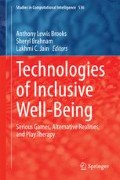Abstract
This paper presents Megame [me-ga-me], a multiplatform game for working memory training and assessment. Megame uses letters and words to amuse, train and assess memory capacity. Based on memory research, the main parameters of the working memory have been identified and some improvement possibilities are presented. While it is not clear that the working memory in itself can be improved, other cognitive functions are identified that may be improved while playing Megame. Other uses of Megame include spelling and vocabulary training and learning modality assessment. Megame is written in Python using an agile and iterative approach, taking advantage from rapid prototyping and allowing for user-driven development.
Access this chapter
Tax calculation will be finalised at checkout
Purchases are for personal use only
Notes
- 1.
- 2.
In Phaedrus, Plato, around 500 B.C.
- 3.
Literally “On the Orator”, written circa 55 B.C.
- 4.
As in Ars Memoriae (“The Art of Memory”) by Giordano Bruno, 1582.
- 5.
Memory, also known as Concentration or Pairs can be played with a standard deck of playing cards or with special decks. Source: http://en.wikipedia.org/wiki/Concentration_(game).
- 6.
This game is described in Kim by Rudyard Kipling, 1901, in Chap. 9. The book is freely available at Project Gutenberg (http://www.gutenberg.org/files/2226/2226-h/2226-h.htm).
- 7.
- 8.
- 9.
- 10.
- 11.
- 12.
Single Directmedia Layer—http://www.libsdl.org/.
- 13.
JavaScript Object Notation—http://www.json.org/.
- 14.
Pygame Subset for Android—http://pygame.renpy.org/.
References
Baddeley, A.: Working memory. Science, New Series 255(5044), 556–559 (1992)
Melby-Lervåg, M., Hulme, C.: Is Working Memory Training Effective? A Meta-Analytic Review. Developmental Psychology, Np (2012)
Radvansky, G.: Human Memory. Allyn and Bacon, Boston (2011)
Rose, S.: The Making of Memory: From Molecules to Mind. Anchor Books/Doubleday (NY) (1992)
Fleming, N.D., Mills, C.: Not Another Inventory, Rather a Catalyst for Reflection. To Improve the Academy, vol. 11, p. 137 (1992)
Bertsch, S., Pesta, B.J., Wiscott, R., Mcdaniel, M.A.: The generation effect: A meta-analytic review. Mem. Cogn. 35(2), 201–210 (2007)
Meyer, D.E., Schvaneveldt, R.W.: Facilitation in recognizing pairs of words: Evidence of a dependence between retrieval operations. J. Exp. Psychol. 90(2), 227–234 (1971)
Wixted, J.T.: A theory about why we forget what we once knew. Curr. Dir. Psychol. Sci. 14(1), 6–9 (2005)
Miller, G.: The magical number seven plus or minus two: Some limits on our capacity for processing information. Psychol. Rev. 63(2), 81–97 (1956)
Dudai, Y.: The neurobiology of consolidations, or, how stable is the engram? Annu. Rev. Psychol. 55, 51–86 (2004)
Glenberg, A.M., Lehmann, T.S.: Spacing repetitions over 1 week. Mem. Cogn. 8(6), 528–538 (1980)
Jensen, K.: On the use of memory models in audio features. In: Symposium of Frontiers of Research on Speech and Computer Music Modeling and Retrieval (FRSM/CMMR—2011), Bhubaneswar, India, pp. 100–107 (2011)
Cattell, R.B.: The measurement of adult intelligence. Psychol. Bull. 40(3), 153–193 (1943)
Redick, T.S., Shipstead, Z., Harrison, T.L., Hicks, K.L., Fried, D.E., Hambrick, D.Z., Kane, D.Z., Engle, R. W.: No evidence of intelligence improvement after working memory training: A randomized, placebo-controlled study. J. Exp. Psychol. Np (2012)
Csíkszentmihályi, M.: Flow: The Psychology of Optimal Experience. Harper and Row, New York (1990)
De Bono E.: Lateral Thinking, Viking (2009)
Edwards, B.: Drawing on the Right Side of the Brain: The Definitive, 4th edn, Tarcher (2012)
Ferrill, P.: Android applications using Python and SL4A, Part 1: Set up your development environment. IBM developer Works (2011)
Rayner, S., Riding, R.: Towards a categorisation of cognitive styles and learning styles. Educ. Psychol: Int. J. Exp. Educ. Psychol. 17(1–2), 5–27 (1997)
Jensen, K., Hjortkjær, J.: An Improved dissonance measure based on auditory memory. J. Audio Eng. Soc. 60(5), 350–354 (2012)
Author information
Authors and Affiliations
Corresponding author
Editor information
Editors and Affiliations
Rights and permissions
Copyright information
© 2014 Springer-Verlag Berlin Heidelberg
About this chapter
Cite this chapter
Jensen, K., Valente, A. (2014). Development of a Memory Training Game. In: Brooks, A., Brahnam, S., Jain, L. (eds) Technologies of Inclusive Well-Being. Studies in Computational Intelligence, vol 536. Springer, Berlin, Heidelberg. https://doi.org/10.1007/978-3-642-45432-5_3
Download citation
DOI: https://doi.org/10.1007/978-3-642-45432-5_3
Published:
Publisher Name: Springer, Berlin, Heidelberg
Print ISBN: 978-3-642-45431-8
Online ISBN: 978-3-642-45432-5
eBook Packages: EngineeringEngineering (R0)

